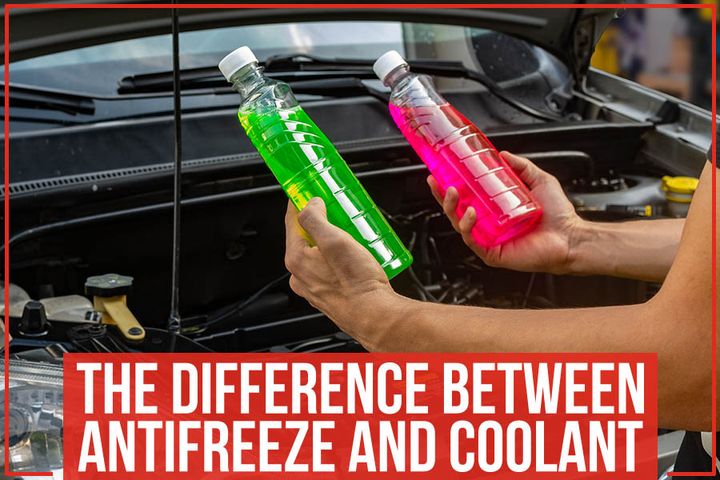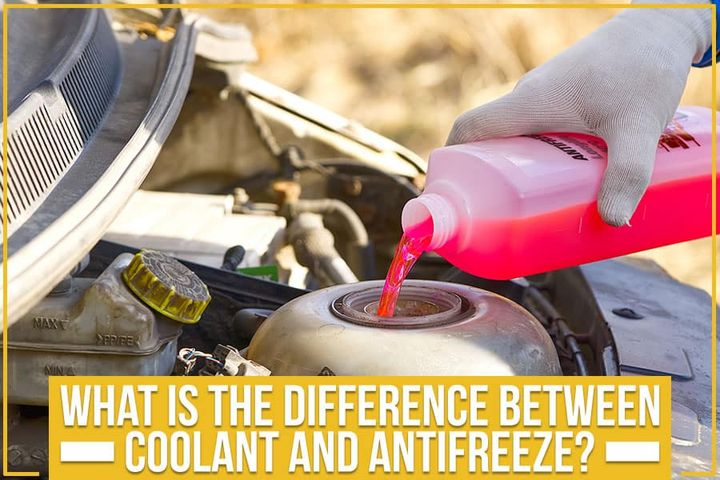


Maintaining the proper cooling system is crucial for ensuring your vehicle's engine operates efficiently and avoids costly repairs. While the terms "antifreeze" and "coolant" are often used interchangeably, they are not the same thing. This article aims to clarify the differences between these two essential fluids and provide a comprehensive understanding of their roles, compositions, and maintenance requirements.

Proper engine cooling is vital for optimal performance, fuel efficiency, and longevity. Failure to maintain the correct coolant mixture can lead to severe consequences, such as overheating, freezing, and corrosion of internal components. Understanding the distinction between antifreeze and coolant is essential for vehicle owners and mechanics.
Antifreeze is a concentrated liquid solution primarily composed of either ethylene glycol or propylene glycol. These glycol-based compounds lower the freezing point of water, preventing the coolant from freezing in cold temperatures. Antifreeze also contains corrosion inhibitors and other additives to protect the cooling system components.
| Antifreeze Composition | |
|---|---|
| Base Compound | Ethylene Glycol or Propylene Glycol |
| Function | Lowers freezing point, raises boiling point, transfers heat |
| Additives | Corrosion inhibitors, lubricants, dyes |
There are several types of antifreeze formulations, each designed for specific applications and vehicle requirements:
Inorganic Acid Technology (IAT)
Organic Acid Technology (OAT)
Hybrid Organic Acid Technology (HOAT)
Coolant, also known as radiator fluid or antifreeze mixture, is the ready-to-use liquid that circulates through the engine's cooling system. It is a mixture of antifreeze concentrate and water, typically in a 50/50 ratio, although the exact ratio may vary.
The primary role of coolant is to absorb and transfer heat away from the engine's internal components, such as the cylinder block and cylinder heads. As the coolant circulates through the engine, it absorbs heat generated by the combustion process and carries it to the radiator, where the heat is dissipated into the surrounding air.
While antifreeze and coolant are related, they have distinct differences:
Antifreeze is a concentrated solution that must be diluted with water, while coolant is a pre-mixed, ready-to-use solution.
Coolant provides corrosion protection for the cooling system components, as it contains the corrosion inhibitors from the antifreeze concentrate.
The proper coolant mixture ratio is crucial for providing both freeze and boil-over protection.
The two primary glycol-based compounds used in antifreeze and coolant formulations are ethylene glycol and propylene glycol. While both serve the same purpose, they differ in terms of toxicity and environmental impact.
| Glycol Comparison | |
|---|---|
| Ethylene Glycol | More commonly used, superior heat transfer, toxic |
| Propylene Glycol | Less toxic, safer for accidental ingestion, more expensive |
Coolant formulations also contain various corrosion inhibitor packages, such as silicates, nitrites, phosphates, and molybdates, designed to protect the cooling system components from rust, scale, and other forms of corrosion.
Coolant manufacturers often use different colors to distinguish between various coolant formulations and to indicate the presence of specific additives or inhibitors.
The cooling system consists of several key components that work together to regulate the engine's temperature:
Radiator and Core: Dissipates heat from the coolant
Water Pump: Circulates the coolant throughout the system
Thermostat: Regulates the flow of coolant based on temperature
Overflow Tank: Accommodates the expansion and contraction of the coolant
Proper coolant maintenance is essential for ensuring optimal cooling system performance and preventing potential issues:
Checking Coolant Level: Regularly check and top up the coolant level in the overflow tank or reservoir.
Coolant Flush and Replacement: Perform a coolant flush and replacement at the recommended intervals to remove contaminants and replenish additives.
Leak Detection and Repair: Inspect the cooling system for leaks and have them repaired promptly to prevent further damage.
Coolant Testing and Analysis: Have the coolant tested periodically to ensure it still provides adequate protection against freezing, boiling, and corrosion.
It's crucial to follow the manufacturer's specifications and use the recommended coolant type and mixture ratio to ensure proper protection and performance. Mixing different types of coolants can lead to compatibility issues and reduced protection.
Additionally, the quality of the water used in the coolant mixture is important. Most manufacturers recommend using distilled or deionized water to prevent scale buildup and corrosion.
Coolants, particularly those containing ethylene glycol, can be toxic if ingested or exposed to the skin or eyes. Proper handling and disposal procedures should be followed to ensure safety and environmental protection.
Biodegradable coolant options, made from plant-based or renewable materials, offer a more sustainable alternative to traditional glycol-based coolants, but may have different compatibility requirements and service intervals.
Understanding the difference between antifreeze and coolant is crucial for maintaining the proper functioning of a vehicle's cooling system. Proper coolant maintenance, following manufacturer recommendations, and considering safety and environmental factors are essential for ensuring optimal engine performance and longevity.
By familiarizing themselves with the roles, compositions, and maintenance requirements of antifreeze and coolant, vehicle owners and mechanics can make informed decisions to keep their engines running smoothly for years to come.
Antifreeze lowers the freezing point of water, preventing the coolant from freezing in cold temperatures. It also contains corrosion inhibitors to protect the cooling system components.
Coolant absorbs heat generated by the engine's combustion process and transfers it to the radiator, where the heat is dissipated into the surrounding air. This helps regulate the engine's temperature and prevent overheating.
The two primary glycol-based compounds used in antifreeze formulations are ethylene glycol and propylene glycol. Ethylene glycol is more commonly used but is toxic, while propylene glycol is less toxic but more expensive.
Using the recommended coolant type and mixture ratio ensures proper protection against freezing, boiling, and corrosion. Mixing different types of coolants can lead to compatibility issues and reduced protection.
The cooling system consists of several key components, including the radiator, water pump, thermostat, and overflow tank. These components work together to regulate the engine's temperature and ensure optimal performance.
Coolant should be flushed and replaced at the recommended intervals specified by the vehicle manufacturer. This helps remove contaminants, replenish additives, and maintain the cooling system's efficiency.
Neglecting coolant maintenance can lead to various issues, such as overheating, freezing, corrosion, and damage to the engine's internal components. This can result in costly repairs and reduced engine longevity.
Mixing different types of coolants is not recommended, as it can lead to compatibility issues and reduced protection. Always use the coolant type specified by the vehicle manufacturer and avoid mixing different formulations.
Coolants, especially those containing ethylene glycol, can be toxic if ingested or exposed to the skin or eyes. Always wear protective gloves and eyewear when handling coolant, and dispose of it properly to protect the environment.
Yes, biodegradable coolant options made from plant-based or renewable materials are available as more sustainable alternatives to traditional glycol-based coolants. However, they may have different compatibility requirements and service intervals.

Miguel started tinkering with car radios as a teenager, fascinated by the intricate dance of wires and circuits. This passion led him to pursue a career as an automotive electrician. For the past 10 years, Miguel has tackled everything from flickering headlights to mysterious electrical gremlins. He thrives on troubleshooting electrical problems and enjoys sharing his knowledge to empower car owners to understand their vehicles better.













